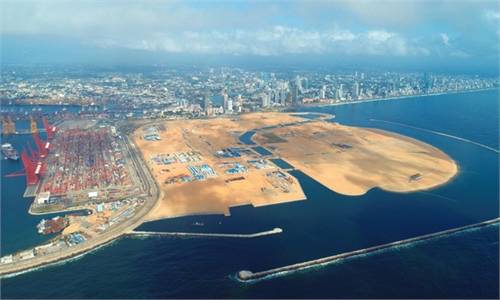
Illustration: Tang Tengfei/Global Times
Zambia has canceled $1.6 billion in agreed upon but not-disbursed Chinese loans, mostly from the Export-Import Bank of China and the Industrial Commercial Bank of China, to help manage its debt woes, the South China Morning Post (SCMP) reported on Monday.The African country announced that it ceased the construction and rehabilitation of several roads, highways and information and technology projects, most funded by the Export-Import Bank of China, according to the SCMP.
While it is unclear whether the SCMP accurately presented relevant information, it is worth noting that the reported termination of some infrastructure projects necessary for economic development suggested that debt problem in the African country has entered a danger zone. Unfortunately, it's not only Zambia that is under growing debt pressure.
After the global financial crisis in 2008-09, central banks in rich countries cut interest rates and made funding cheap, but the trend has been dramatically changed by a storm of soaring food and fuel prices. The global financial and economic outlook has soured rapidly in recent months, with central banks in developed countries, especially the US, unleashing what may prove to be the most aggressive tightening of monetary policy since the 1980s. Most developing countries own their debt in US dollar, so interest rate hike announced by the US Federal Reserve (Fed) and a stronger dollar could escalate debt problems in developing countries and cause massive capital outflow.
Sri Lanka has already defaulted on its debt, and its financial woe may be just a prelude to a wider global debt crisis. Outside of Sri Lanka, the list of developing countries that appear vulnerable is long and varied. More than 20 emerging countries have foreign bond yields of more than 10 percent. Pakistan, Ghana, Egypt and Tunisia are all holding bailout talks with the IMF, according to the Financial Times.
More and more developing countries are facing debt problems, which directly affects the local economic development and infrastructure construction, and also affects the normal economic cooperation between those developing countries and China to a certain extent. It is unreasonable to see infrastructure projects funded by Chinese loans are influenced and ceased by the impacts started by irresponsible monetary policy adopted by the US. This situation needs to be changed.
First, the US and Western countries should take more responsibility for this round of looming debt crisis in developing countries. A series of macroeconomic policy mistakes in the US has plunged itself into a dual crisis of inflation and recession. Its aggressive monetary policy is now exacerbating capital outflows and currency depreciation pressures on emerging markets and developing countries, causing persistent current account deficits, overvaluation of local currencies and heavy debt burdens on some countries.
Second, in the face of the serious impact of developed countries' irresponsible economic and monetary policies and geopolitical conflicts, developing countries should speed up the process of de-dollarization while actively coping with the current debt problem. In a dollar-dominated world financial system, the Fed often ignores the spillover effects of its monetary policy. To hedge the risks of US monetary policy mistakes on their own economies, emerging markets and developing countries should increase the settlement of other currencies.
Third, whether it is dealing with short-term economic difficulties or strengthening long-term economic strength, cooperation among developing countries, especially cooperation with China, are of vital significance. Only with their economies continue to grow can their capacity to deal with risks be strengthened.
Chinese projects in these countries are often not eyeing short-term returns, and Western developed economies are unwilling to invest in such projects. But these projects play an important role in promoting regional connectivity and building up the strength of local economies. The development of these projects that are about the long-term prosperity and local livelihood should be guaranteed even in difficult conditions.
The author is a reporter with the Global Times. bizopinion@globaltimes.com.cn



